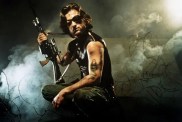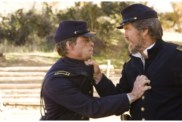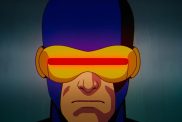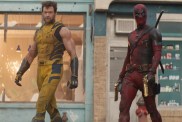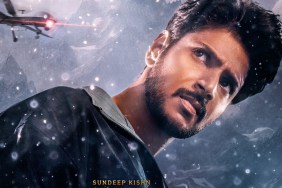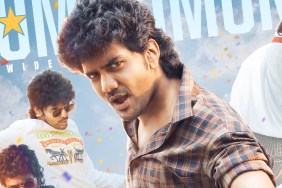Grand Theft Auto (1977)
DIR: Ron Howard

I grew up watching a lot of Nick at Nite and TV Land, which meant re-runs of “The Andy Griffith Show” and “Happy Days” exposed me to a redheaded kid named Ron Howard. After years spent in front of television cameras, Howard segued into directing with his 1977 debut Grand Theft Auto, an action-comedy about a rich girl who steals her dad’s Rolls Royce and heads off to Las Vegas to get married. The film outperformed its budget and gave Howard further opportunities to work behind the camera, which he used to make a string of films in the 1980s — Splash, Cocoon, and Parenthood — before helming his first Best Picture nominee Apollo 13 in 1995. Howard won both Best Picture and Best Director for A Beautiful Mind, and was nominated for both again for his work on my personal favorite of his, Frost/Nixon. Rush is another solid effort of his, and Howard’s newest film In the Heart of the Sea is slated for a December 11, 2015 release — though for me, he will always be best-remembered as the narrator of “Arrested Development“, no matter his directorial output.
Ordinary People (1980)
DIR: Robert Redford

Robert Redford has directed several films over the course of his career, but unlike others on this list, it is his debut feature that proved to be his most successful. Ordinary People, a drama about a well-to-do family’s adjustment following the death of its eldest son, won Redford Best Picture and Best Director honors, and he has had his feet entrenched in both directing and acting since the film was released in 1980. I’ve seen only a handful of Redford’s directorial efforts, Quiz Show being a major stone I’ve yet to turn over, but unlike the other people on this list Redford’s biggest legacy might not be his film career but rather the film festival he helped start in Park City, Utah back in 1978. I speak, of course, of Sundance, named after Redford’s iconic character in Butch Cassidy and the Sundance Kid.
This is Spinal Tap (1984)
DIR: Rob Reiner

Full disclosure, I am not a big fan of This Is Spinal Tap. It’s funny at times, but I find some of its comedic notes just a little off-key; some gags work, others fall flat. However, the film marks the directorial debut of Rob Reiner, who went on to make The Princess Bride, When Harry Met Sally, and A Few Good Men, a trio of films any director should be proud to call his or her own. Further, one of the most celebrated cult films of all-time, This Is Spinal Tap popularized the mockumentary, though again, it is far from my favorite within the genre — that would be Woody Allen’s Zelig, which came out a full year earlier. I’m sort of a Woody Allen nut, I guess. Still, This Is Spinal Tap put Reiner on the map, and while the quality of his output these days is nowhere near that of the films he directed in the 1980s and 1990s, we can’t all stay at the top of our game forever.
Dances with Wolves (1990)
DIR: Kevin Costner

After starring in Silverado, Bull Durham, and Field of Dreams, Kevin Costner literally dances with wolves in his directorial debut. Okay, I’m just kidding, he doesn’t. Or does he? I don’t know, it’s been so long. Set during the Civil War and following a lieutenant (Costner) exiled to a remote western outpost who befriends wolves and Indians, Dances with Wolves opened in 1990 to impressive reviews and scooped up seven Oscars including Best Picture and Best Director for Costner, marking perhaps the most notable directorial debut of any actor-turned-director in the history of actors-turned-directors. Costner went back to acting (Robin Hood: Prince of Thieves, JFK, and more) before directing his sophomore feature in 1997, the critically-derided The Postman. He followed a similar pattern again before directing his third feature, Open Range, in 2003, but he hasn’t directed since, and it doesn’t appear as though he plans to step behind the camera again anytime soon.
[yt id=”a2lns2N3h0c” width=”400″ time=”133″]Also, I should give a quick shoutout here to my 6th grade reading and American history teacher, one of the Civil War re-enactors enlisted as an extra for the film. You can see him for a few seconds during the opening credits in the clip above, writing a letter while his comrade in the foreground hula-hoops a cap on the tip of his bayonet. He gives a standout performance, right? I consider myself famous by extension.
The Virgin Suicides (1999)
DIR: Sofia Coppola

I know what you’re thinking: “Jordan, there are a lot of white guys on this list.” Astute observation; let’s change that. Sofia Coppola‘s acting career, such as it could be called at the time, began as a child in father Francis Ford Coppola‘s relatively well-known films The Godfather and The Godfather: Part II. Coppola showed up in a few other projects over the course of the 1980s and 1990s, including the third Godfather film, but she soon found her calling as a director, beginning with her debut feature The Virgin Suicides. Coppola’s second feature, however, is the one I most adore, that being 2003’s Lost in Translation. I don’t know how you guys feel about Lost In Translation, but it’s what I would call a “towering achievement,” so even if her other work doesn’t quite match up — or in the case of The Bling Ring, is just flat out bad — should we really fault her? Hey, I’m directing the question at you! Should we?!
The Man Without a Face (1993)
DIR: Mel Gibson

Chalk it up to my dad talking about Braveheart a lot when I was a kid, but I didn’t even know until a few days ago — while doing research for this article — that Mel Gibson‘s epic tale of Scottish rebel William Wallace wasn’t his first film as a director. After making his name in the Mad Max and Lethal Weapon films, Gibson directed himself in The Man Without a Face, a drama about a disfigured recluse and former teacher and his relationship with a troubled student. The film was well-received, but Gibson had his official coming-out party with Braveheart, winning Best Picture and Best Director for his efforts. His next film, The Passion of the Christ, is his most controversial work to date — save for those infamous voicemails a few years back — as well as his most financially successful. Gibson took a bit of a hiatus from both acting and directing after making Apocalypto in 2006, but he has since found his way back on screen and is preparing his next feature, Hacksaw Ridge, for next year.
Reality Bites (1994)
DIR: Ben Stiller

Like a few other films on this list, I confess to never seeing Reality Bites, but I have seen The Cable Guy, Zoolander, and Tropic Thunder, and I have a soft spot for them all. Reality Bites was the first step in Ben Stiller‘s directorial career, a romantic comedy about college graduates searching for work and love in Houston. Stiller has been a staple ever since both in front of the camera and behind it, but it is his work as a director I find most impressive. Stiller deftly mixes comedic and thriller elements in The Cable Guy, nails social satire in Zoolander, and shows immense control directing both action and comedy in Tropic Thunder. He turned his sights to more serious fare with 2013’s The Secret Life of Walter Mitty to very mixed results, but he’ll return to his funny bone next year as both director and star of Zoolander 2.
Head of State (2003)
DIR: Chris Rock

“But Jordan: Eastwood, Gibson, Coppola, Clooney, all these directors are white!” You’re right, they are. Enter funnyman Chris Rock. I don’t care what Rock is doing, he could read from the yellow pages — do they still print those? — for an hour straight and the result would be worth watching. Rock continued to show growth as a director with last year’s Top Five, his best film to date thus far, but his directorial career began in earnest in 2003 when he made Head of State, a comedy about a man (Rock) thrust into a presidential campaign after the original candidate dies unexpectedly. It’s been a while since I saw Head of State, so I’m admittedly a bit foggy on the exact details of the plot, but I remember it being both funny and quite smart, two descriptors that make sense to use when Chris Rock is the man you are describing. Rock directed I Think I Love My Wife four years after Head of State came out, and then it took a full seven years before he brought Top Five to the big screen. I haven’t seen his sophomore feature, but Head of State and Top Five are easy to vouch for, the latter serving as one of my favorite comedies of last year.

